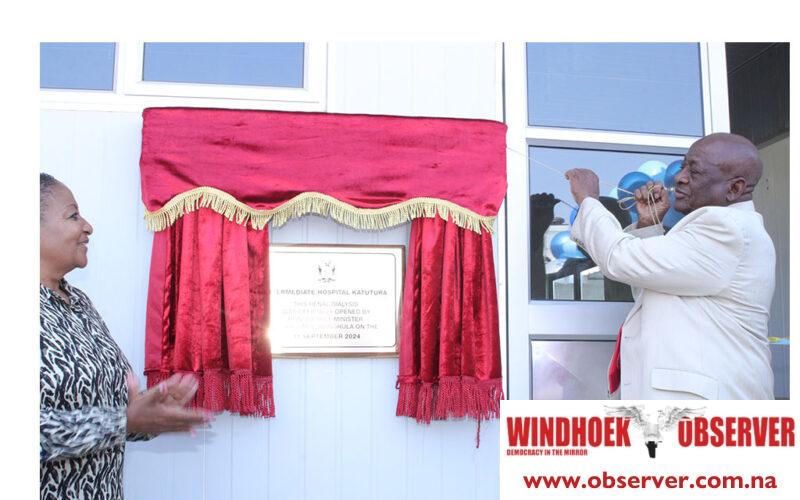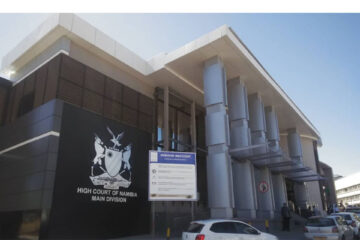Niël Terblanché
The Katutura Intermediate Hospital in Windhoek now boasts a state-of-the-art dialysis unit.
Dr. Kalumbi Shangula, the Minister of Health and Social Services, officially commissioned the unit on Wednesday that was built at a cost of N$16.5 million.
Shangula said that the new facility represents a giant step forward in providing life-saving treatment to Namibians suffering from chronic kidney disease, a condition that requires regular dialysis for patients whose kidneys are unable to filter blood effectively.
“With over 85% of the Namibian population relying on public healthcare, the establishment of dialysis services at Katutura Intermediate Hospital addresses a long-standing gap in the country’s health infrastructure,” he said.
He added that until recently, dialysis services were only available in select public hospitals, including Windhoek Central, Oshakati, and Rundu Intermediate Hospitals.
According to the minister, demand for these services has been growing steadily, driven by the increasing number of patients diagnosed with both acute and chronic renal failure.
“The opening of this dialysis unit marks a vital milestone in our efforts to expand healthcare services for Namibians. It is a testament to our commitment to ensuring access to essential, life-saving treatments for all,” he said.
The newly commissioned facility at Katutura Hospital, equipped with 16 haemodialysis machines, is staffed by seven dialysis nurses and three resident nephrologists, ensuring high-quality care for patients.
The unit has been operational since 17 July 2024, and in that short time, it has already performed 118 dialysis sessions for 31 patients.
The dialysis unit is the first of its kind in Namibia, offering specialized care and easing the burden on patients who previously had limited access to such treatment within the country. This development promises to enhance the quality of healthcare for many Namibians in need of dialysis.
Leading the operational team is Michael Daniel Okako, a registered nurse from the Windhoek Central Hospital’s Intensive Care Unit.
He is currently training nurses in the use of the state-of-the-art equipment.
Okako, along with Sister Twahafiwa Shapopi, will oversee the new unit’s operations.
“This facility will provide advanced treatment options for patients with renal failure,” Okako said.
Shangula expressed pride in the healthcare professionals who worked tirelessly to bring the unit to fruition.
“This dialysis unit exemplifies our determination to advance medical technology and ensure that Namibians can access specialised care when they need it most,” he said.
Last week, the Observer reported that the ministry will commission additional dialysis units at other hospitals across the country.
According to Shangula, the broader national strategy involves the establishment of dialysis units in seven hospitals across the country.
As part of this programme, Oshakati Intermediate Hospital will also house 16 machines, while facilities in Keetmanshoop, Rundu, Katima Mulilo, Walvis Bay, and Otjiwarongo will be equipped with additional units.
“This strategic distribution aims to decentralise dialysis services, making them more accessible to patients in various regions of Namibia,” he said.
Shangula said that these facilities will alleviate the strain on the existing dialysis centres and reduce the need for patients to travel long distances to access treatment.
The dialysis programme, which began as an initiative in the early 2000s, followed after initial priority was given to setting up a cardiac unit, as cardiac patients were being sent abroad for costly treatments.
“As the need for dialysis services became more pressing, the Ministry shifted focus to establish this vital programme,” he said.
Shangula added that the government has approved a five-year plan worth approximately N$16 billion to modernise public health services.
The plan includes upgrades to infrastructure, procurement of medical equipment, and the recruitment of healthcare professionals.
Last week, the ministry’s executive director also announced plans to expand Intensive Care Unit (ICU) facilities throughout the country.
Before the Covid-19 pandemic, the country had about 22 ICU beds in all the public hospitals.
The ministry has since installed ICU facilities in all 34 district hospitals.
This expansion, according to Nangombe, includes not only the equipment but also the necessary medical staff.




